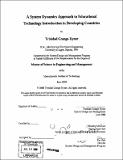| dc.contributor.advisor | J. Bradley Morrison. | en_US |
| dc.contributor.author | Grange-Kyner, Trinidad | en_US |
| dc.contributor.other | System Design and Management Program. | en_US |
| dc.coverage.spatial | d------ | en_US |
| dc.date.accessioned | 2009-03-16T19:32:40Z | |
| dc.date.available | 2009-03-16T19:32:40Z | |
| dc.date.copyright | 2008 | en_US |
| dc.date.issued | 2008 | en_US |
| dc.identifier.uri | http://hdl.handle.net/1721.1/44710 | |
| dc.description | Thesis (S.M.)--Massachusetts Institute of Technology, System Design and Management Program, 2008. | en_US |
| dc.description | Includes bibliographical references. | en_US |
| dc.description.abstract | Developing nations around the globe are focused on ways to use Information and Computing Technologies (ICTs) as springboards to advance their national development in all areas, including education. There are multiple ways in which various organizations are tackling the unique challenges these nations face in equipping their schools with modem educational technologies. This study evaluates two examples of computing technology intended for wide-scale deployment in developing nations. It aims to test the hypothesis that in order to be successful, ICT implementations require adequate funding, available electrical and telecommunication infrastructure, the presence of strong local champions and a local support ecosystem. Interviews were conducted with stakeholders involved in two pilot implementations in Nigeria. A system dynamics model was used to investigate into the relative effects of relevant factors on the speed of ICT deployment. The results from the modeling show the need for a significant increase in financial investment, in order to cover all costs associated with ICT deployments. The results also revealed the daunting task nations face in equipping all students with individual laptops and it presents some alternatives to a wide-scale deployment of one-to-one computing. Finally, the results highlight the necessity of providing economical means of completely powering ICTs in order to rapidly deploy these technologies to the nation's schools. A number of recommendations were made for the consideration of any developing nation undertaking ICT implementations in education. | en_US |
| dc.description.statementofresponsibility | by Trinidad Grange-Kyner. | en_US |
| dc.format.extent | 86 p. | en_US |
| dc.language.iso | eng | en_US |
| dc.publisher | Massachusetts Institute of Technology | en_US |
| dc.rights | M.I.T. theses are protected by
copyright. They may be viewed from this source for any purpose, but
reproduction or distribution in any format is prohibited without written
permission. See provided URL for inquiries about permission. | en_US |
| dc.rights.uri | http://dspace.mit.edu/handle/1721.1/7582 | en_US |
| dc.subject | System Design and Management Program. | en_US |
| dc.title | A system dynamics approach to educational technology introduction in Developing countries | en_US |
| dc.type | Thesis | en_US |
| dc.description.degree | S.M. | en_US |
| dc.contributor.department | System Design and Management Program. | en_US |
| dc.identifier.oclc | 297431788 | en_US |
